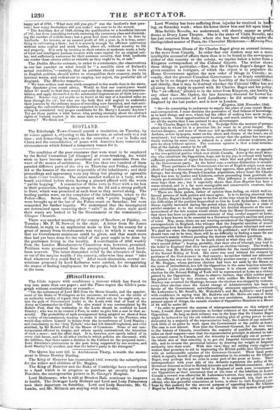SCOTLAND.
The Edinburgh Town-Council passed a resolution, on Tuesday, by 20 voices against 4, objecting to the Income-tax, as suited only to a war time ; and demanding its repeal, as the cessation of war in India and China and the consolidation of peace with America have removed the circumstances which formed a temporary reason for it.
The condition of the poor creatures that were wont to be employed by the Relief Committee [of Glasgowl at stone-breaking, &c. would seem to have become more precarious and more miserable from the want of the means of subsistence. Not less than two hundred of them paraded different parts of the city on Thursday and Friday, soliciting aid at the houses of the more respectable of the inhabitants ; and their proceedings and appearance were any thing but pleasing or agreeable to their richer brethren. The entire number walked in a body, with a board exhibited before them having a placard affixed with the words " public begging." A committee of three were in front with a tin box in their possession, having an aperture in the lid and a strong padlock in front, which was presented at each door as they moved along. The leading parties were, on the complaint of the inhabitants, taken to the Police-office. Seven of them, charged with "public begging," &c. were brought up at the bar of the Police-court on Saturday, but were remanded for further inquiry. We understand that the .unemployed are determined upon renewing their " calls " in the above style until their wants are looked to by the Government or the community.— Glasgow Chronicle.
There was another meeting of the county of Renfrew, at Paisley, on Tuesday ; Mr. P. M. Stewart in the chair. A, letter from Sir James Graham, in reply to an application made to him by the county for a grant of money from Government, was read ; in which it was stated that no Government assistance could be given, and that much more than had yet been done for the relief of the poor ought to be done by the gentlemen living in the locality. A contribution of 2001. weekly from the London Manufacturers Committee was, however, promised. Petitions were presented from the unemployed labourers and hand- loom weavers. The latter demanded relief by the allocation of lands, or out of the surplus wealth :I the country, otherwise they must " take food wherever they could find it." After much discussion, several re- solutions proposed by Lord Kelburne were carried, for reorganizing the means of finding employment for the people, both in the field and at the loom.


























 Previous page
Previous page